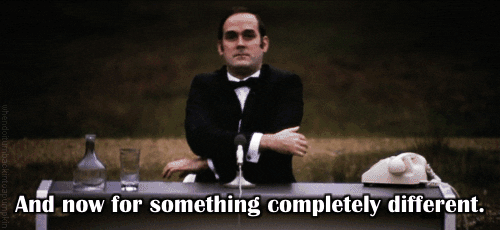It’s a time of plenty, friends, by just about any measure (which isn’t to say that this plenty is properly distributed, or that there is no room for improvement, but that’s another matter). And yet I notice quite often that my mind has a habit of seeing scarcity everywhere. See, for example, my almost perilous aversion to wasting food, culminating in narrowly avoided tragedy in the glass-shard soup incident of 2015. My grandparents lived through the Depression, yes, but why is its hold so strong on me still, when I grew up wanting nothing?
Scarcity looms everywhere, though, probably as a form of the common human negativity bias. It tries to keep me alive by telling me to make hay while the sun shines, (seriously, get out there, it’s sunny, what are you doing, the sun will go away and you won’t have enough hay, dummy!) It keeps me alert to potential danger by reminding me that a bird in the hand is worth two in the bush (and, hey, you’ve only got one bird in that hand; what are you going to do when you’re next in need of a bird? You think birds grow on trees?)
Pretty obnoxious, really. And one place it comes up in this kind of meta way is when I am working on an idea: some little voice in the back of my head is piping up: “Hey, what about the next idea? Is this the only one you’ve got? You might never have another. Just thought you should know!”

It is, to say the least, hardly helpful. There’s nothing less creativity-inspiring than worrying about the potential future scarcity of creativity, just as there’s nothing less satisfying to the stomach than fretting about where one’s next meal will come from. Yet even as I’m working on picking what I like and seeing how it grows, the little scarcity gremlin looks over my shoulder and warns me that I’m probably going to run out of ideas soon, and probably half of the ones I’ve got are going to fizzle out before I can finish…just trying to be helpful!
So there I am, clinging white-knuckled to the little list of ideas I’ve got, squeezing the life out of the poor things. But in Big Magic, which I read recently (and you should too, if you want to live a more creative life and could use a little boost), Elizabeth Gilbert has an interesting idea that turns my scarcity gremlin on his head: she pictures inspiration as a sentient force, a personified entity, that goes where it likes, and stays if you entertain it generously. With a straight face, she tells the story of the time that the idea for a novel visited her for a while, then once she’d demonstrated that she didn’t have the space in her life to tend to it fully, entered the body of Ann Patchett the day that they met. Ann Patchett ended up writing this book that so badly wanted to be written. Which is not to say “cling harder and panic when you have an idea, lest it enter the body of a more talented nearby artist.” (That would be our neighborhood scarcity gremlin talking again). I suppose it’s just to say: be grateful when it’s there. Welcome it. Don’t squeeze the life out of it.
Now I’m doing better, taking some deep cleansing breaths and welcoming the friendly inspiration spirit in. I’m living in abundance mode, not scarcity mode. I’m countering that negativity bias. Noticing the plenty, not the lack.
But then–oh no–such plenty. Ideas coming so hot and heavy that I have several different digital to-do lists, like so many crumpled purse-bottom post-it notes, cluttering up the joint. Ideas coming so fast and incomplete that they talk over each other and my mind starts to feel all jerky and fuzzy like it does when I’ve been visiting the portal too much. Each one is a welcomed guest but, “well,” I begin to say to the throng of them in my living room, “I do visit the portal a fair amount, and I have my day job to consider, and my social life, and I’ve got to stay showered and need to shop for groceries now and then, and as it is I’m already halfway through two of you, so I might not get to you” (pointing to one of them in the back, a new arrival staring at me slackjawed) “until halfway through next year, at the earliest, I’m sorry to say.”
How do I pick what I like and see how it grows when I struggle to follow a thread long enough to plant it, and when I like quite a lot of things?
Don’t be fooled. This is scarcity talking. Scarcity of time. Like any other scarcity fear, there’s a grain of truth within it, but it’s hardly helpful to let it run the show.
So you have to conquer the first scarcity, the fear that ideas will come at all; perhaps you do this by trusting that the idea has its own will, and will find you if and when it pleases, no matter how tightly you squeeze or how much you suffer in the meantime, so you may as well relax. Then, when you’ve caught one, you have to conquer the second scarcity fear: the fear of scarcity of ability, the fear that you won’t do the idea justice and shouldn’t even try. You do this by learning to entertain it gently, and just follow it where it leads.
But how do you conquer the third scarcity, of time to follow the many possible leads you’ve got? You’re indecisive. You don’t know which one is top priority. (After all, if everything is top priority, nothing is, and there we are in the bowels of the couch playing Flash games until long after our bedtime). Okay, so just do something. Do literally anything. Print out a list and throw a dart at it, see which one it lands nearest. Use a random number generator. Just start. Just for ten minutes. Just mess around with it on your phone while you wait in line at the pharmacy.
But the fear is still there. The gremlin hasn’t left. It says: “okay, you’ve got a lot for now, that’s great. But what will you do in five years? You haven’t really got five years’ worth on that list, do you? Aren’t you worried that you’re going to to flame out in a while, even if you do find the time to do any of them?”
That’s when I look that gremlin in the eye and go, “listen, buddy, I know this game.” I know all about trying to pin my future down and buy it an insurance policy. It’s a fool’s errand. I look back to what I was dead certain I wanted my long-term future to look like when I was 15, 18, 20, 22, 25, 28…every single time, if I could have locked it in, of course I would have. But every single time, I either didn’t get it, or I got some very different version of it, and thank God for that, because I can’t imagine much worse than being trapped in a life younger-me chose. She doesn’t know anything about me.
So ideas will come. And I’ll entertain them as best I’m able. And I’ll get new ones, or I won’t, because maybe me in several years won’t even want them, and that’s totally fine. And I’ll find the time, here and there, or maybe future me will. She can figure it out.




